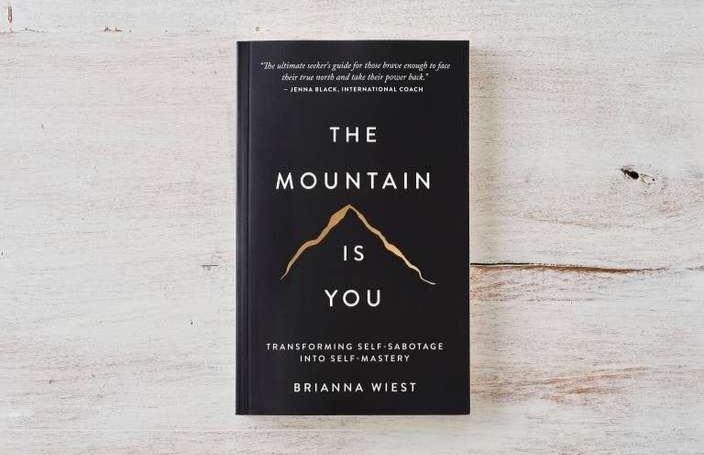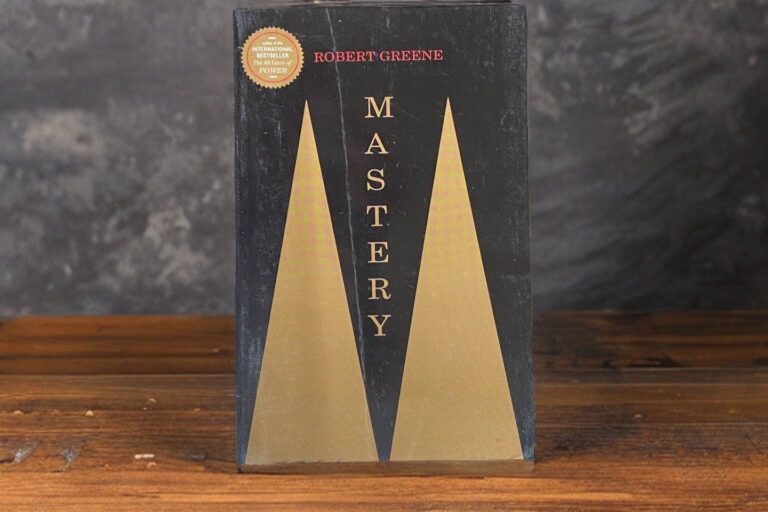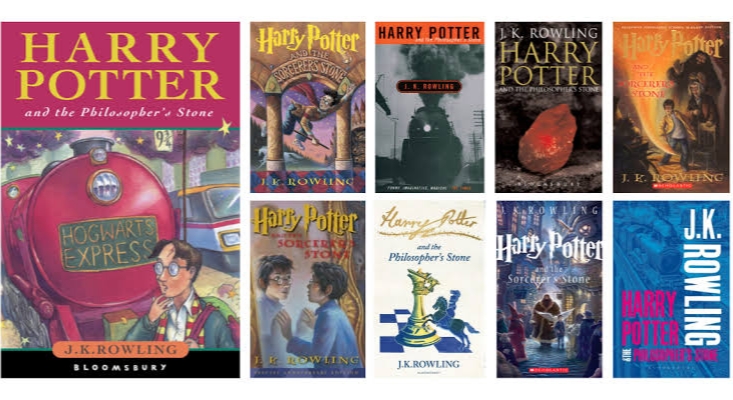
- Title: The Mountain Is You: Transforming Self-Sabotage Into Self-Mastery
- Author: Brianna Wiest, a bestselling self-help author and thought leader known for her relatable, psychology-based insights on emotional intelligence and personal transformation.
- Publication Details: Published in 2020 by Thought Catalog Books.
- Genre: Self-help, personal development, psychology.
- Length: Approximately 250 pages.
- Target Audience: Young adults, professionals, students, and anyone seeking to overcome self-doubt, break destructive habits, or achieve personal growth.
Introduction
What if the biggest obstacle to your success is you? In The Mountain Is You, Brianna Wiest delivers a transformative guide to conquering self-sabotage and unlocking your true potential. Using the powerful metaphor of a mountain to represent internal struggles—fear, limiting beliefs, and unresolved emotions—Wiest blends psychological wisdom with practical strategies to help readers turn self-destructive habits into pathways for self-mastery. This book is a beacon for anyone feeling stuck, offering a roadmap to navigate inner challenges and build a more authentic, fulfilling life. Whether you’re grappling with procrastination, self-doubt, or fear of change, The Mountain Is You empowers you to climb your personal mountain and embrace lasting growth.
Summary of The Mountain Is You
The Mountain Is You is a self-help masterpiece that explores why we sabotage our own progress and how to transform those barriers into opportunities for growth. Wiest argues that self-sabotage—behaviors like procrastination, perfectionism, or avoiding risks—stems from subconscious fears, past traumas, or limiting beliefs that keep us stuck in familiar but unhelpful patterns. The book is structured in two core parts: understanding the roots of self-sabotage and developing practical tools for self-mastery.
In the first part, Wiest delves into the psychology of self-sabotage, explaining how it often serves as a misguided attempt to protect ourselves from discomfort or failure. For instance, someone might avoid pursuing a dream career due to fear of rejection, or cling to unhealthy relationships because they feel familiar. Wiest uses relatable examples, like the person who overworks to avoid emotional vulnerability, to illustrate how these patterns form. She emphasizes that self-awareness is the first step to breaking these cycles, encouraging readers to identify their triggers and emotional wounds.
The second part focuses on actionable strategies for transformation. Wiest offers tools like journaling to uncover hidden beliefs, mindfulness to process emotions, and reframing negative thoughts to shift perspectives. For example, she suggests writing about a recurring fear to understand its origins, then challenging it with evidence of past successes. Her conversational, empathetic tone makes these concepts accessible, while her emphasis on small, consistent steps ensures readers feel empowered rather than overwhelmed. By the end, the book inspires a shift from self-sabotage to self-mastery, urging readers to view their inner “mountain” not as an obstacle but as a path to growth.
Key Themes and Messages
- Self-Sabotage as a Protective Mechanism: Self-destructive habits, like avoiding risks or overthinking, are often subconscious efforts to stay safe, but they limit potential.
- Embracing Discomfort for Transformation: Growth requires facing fears and stepping outside comfort zones, even when it feels daunting.
- Authenticity and Self-Compassion: Accepting your true self and treating yourself kindly are foundational to overcoming internal barriers.
- The Power of Incremental Change: Small, consistent actions—such as daily reflection or habit-building—lead to profound, lasting progress.
- Emotional Resilience: Processing emotions, rather than suppressing them, builds the strength needed to navigate life’s challenges.
Notable Quotes
- Challenges are not just roadblocks; they guide you toward your true purpose and potential.
- Significance: This idea encourages readers to see setbacks as opportunities for self-discovery and growth.
- Self-sabotage often stems from ignoring our deepest emotional needs out of fear or doubt.
- Significance: Highlights the importance of addressing underlying emotions to break harmful patterns.
- Small, daily efforts are the building blocks of significant, lasting change.
- Significance: Emphasizes the value of consistency in creating meaningful progress.
- True strength comes from understanding and embracing your emotions, not avoiding them.
- Significance: Promotes emotional awareness as a cornerstone of personal resilience.
- Inner peace is achieved by trusting yourself and letting go of the need for external validation.
- Significance: Encourages self-reliance and authenticity as keys to lasting contentment.
Key Takeaways
- Identify Your Triggers: Reflect on the fears, past experiences, or beliefs driving your self-sabotage. For example, journal about why you avoid certain tasks to uncover hidden anxieties.
- Practice Self-Compassion: Treat yourself with kindness during setbacks, recognizing that mistakes are part of growth. Replace self-criticism with encouraging self-talk.
- Start with Small Steps: Build new habits through manageable actions, like meditating for five minutes daily or setting one achievable goal each week.
- Reframe Challenges as Opportunities: Shift your mindset to view obstacles as chances to learn. For instance, a failed project can teach resilience rather than define failure.
- Cultivate Emotional Awareness: Use mindfulness or journaling to process emotions, helping you break cycles of avoidance or self-doubt.
Review and Analysis
Strengths
The Mountain Is You stands out for its relatable, empathetic tone, which feels like a supportive conversation with a trusted mentor. Wiest’s mountain metaphor vividly captures the idea of internal struggles, making complex psychological concepts tangible and engaging. The book’s practical tools, such as journaling prompts and mindfulness exercises, empower readers to apply its lessons immediately. For example, Wiest’s suggestion to write about a fear and counter it with evidence of past successes is both accessible and effective. Additionally, the book’s focus on universal themes like self-doubt and resilience makes it relevant to a broad audience, from young professionals to those navigating life transitions.
Weaknesses
Some readers may find the psychological discussions dense, requiring focused effort to fully absorb. The book’s introspective approach might feel repetitive for those seeking quick, surface-level solutions. Additionally, concise chapter summaries or visual aids could enhance its accessibility, helping readers revisit key points more easily. Despite these minor flaws, the book’s depth and practicality outweigh its limitations.
Overall Impression
The Mountain Is You is a compelling, transformative guide that blends emotional insight with actionable advice. It’s an invaluable resource for anyone seeking to overcome self-sabotage and build a more authentic, fulfilling life. Wiest’s ability to balance psychology with practicality makes this book a standout in the personal development genre. Rating: 8.5/10.
Author’s Perspective and Credibility
Brianna Wiest brings authenticity to The Mountain Is You through her background as a writer specializing in emotional intelligence and self-actualization. Her personal experiences with overcoming self-doubt, combined with her ability to distill psychological research into relatable advice, make her a credible voice in personal development. Wiest’s active presence on platforms like Instagram, where she shares daily insights on growth and resilience, further strengthens her connection with readers, reinforcing her expertise in helping people navigate internal challenges.
Target Audience and Relevance
This book is perfect for young professionals, students, or anyone feeling stuck due to self-doubt, fear of failure, or procrastination. Its emphasis on self-compassion and authenticity resonates in today’s fast-paced, comparison-driven world, where social media and societal expectations can amplify self-sabotage. By offering timeless strategies for emotional resilience and personal growth, The Mountain Is You addresses modern challenges while remaining relevant across contexts, making it a go-to resource for anyone seeking meaningful change.
Comparison to Similar Works
Compared to Atomic Habits by James Clear, which focuses on building habits through systems, The Mountain Is You delves deeper into the emotional and psychological roots of behavior, offering a more introspective approach. While Daring Greatly by Brené Brown emphasizes vulnerability and courage, Wiest’s book stands out for its structured path to self-mastery, blending psychology with practical exercises like journaling and mindfulness. This makes it a unique complement to other personal development books, offering both emotional depth and actionable steps.
Discussion Questions
- What specific habits or thoughts are preventing you from reaching your goals, and how can you address them?
- How can you reframe a recent setback as an opportunity for personal growth?
- What small, daily action could you take to start overcoming your inner “mountain”?
- How does comparing yourself to others fuel your self-sabotaging behaviors, and what steps can you take to stop?
- What does living authentically mean to you, and how can you incorporate it into your daily life?
Additional Resources
- Related Readings: Explore Atomic Habits by James Clear for practical habit-building strategies or The Gifts of Imperfection by Brené Brown for insights on embracing authenticity.
- Public Domain Resources: Free online psychology texts or mindfulness guides, available through platforms like Project Gutenberg, can deepen your understanding of self-awareness.
Conclusion
The Mountain Is You by Brianna Wiest is a transformative guide to turning self-sabotage into self-mastery, blending deep emotional insights with practical tools for lasting change. It’s a must-read for anyone ready to confront their inner obstacles and build a more authentic, fulfilling life. Start your journey today by taking one small step—whether it’s journaling, practicing mindfulness, or simply reflecting on your goals—to climb your own mountain and unlock your true potential.






